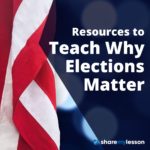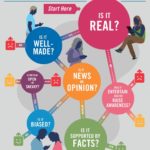This deliberation will have students view short video clips and news articles to analyze the effect of fake news on traditional media outlets, the reasons and incentives for purveyors of “fake news,” and provide students with resources to strengthen their media literacy skills. Students will use this information to develop strategies to identify “fake news” and improve their news literacy.
The Fundamentals of News
E.S.C.A.P.E. Junk News
After the Polls Close: 2020 Election Results to Inauguration
In this collection, you will find resources for teaching about the inauguration, news lessons surrounding the 2020 election, ways to help students engage in civil discourse, ideas for student civic engagement, strategies for discussing controversial issues in the classroom and more resources about the foundations of democracy and government.
Civic Education and Election Resources

It’s election season in the United States and a good time for students to understand why local and national politics matter and the core principles on how our democracy and elections works. What is gerrymandering? How can we strengthen our democracy? Plan how to answer questions like these as Election Day draws closer. Use these free K-12 civic education lessons, activities, blogs and webinars to help you educate students on the election and the importance of counting every vote. Additional topics include fostering civil discourse, fighting fake news, voting rights and debate ideas to keep your students informed and engaged.
Fake News – What’s the Big Deal?
Decoding the News: Building Savvy Media Consumers
Objective: This lesson will promote understanding about what it means to be “news literate” and how learning to analyze media reports about current events can foster civic engagement.
Good News Club v. Milford Central School (2001)
Is a public school that refuses to let a religious club use its facilities violating the Free Speech Clause of the Constitution? This case summary shows how the Supreme Court answered that question in 2001.
Fact Finder: Your Foolproof Guide to Media Literacy
Are your students savvy searchers? Can they spot the difference between a straight news article and an opinion piece? Do they recognize bias in their sources … or in themselves?
Tackle these challenges and more using Fact Finder’s 11 flexible, multimedia lesson plans. Eight skill-building lesson plans introduce essential media literacy concepts through engaging explainer videos and colorful infographics that help students revisit, retain and apply the key concepts. The accompanying News or Noise? Media Map provides a collection of examples ready for students to analyze and evaluate with the support of worksheets and discussion prompts. Three reporting lesson plans help students take what they’ve learned and apply it to their own content creation, inspired by the issues that matter to them.



